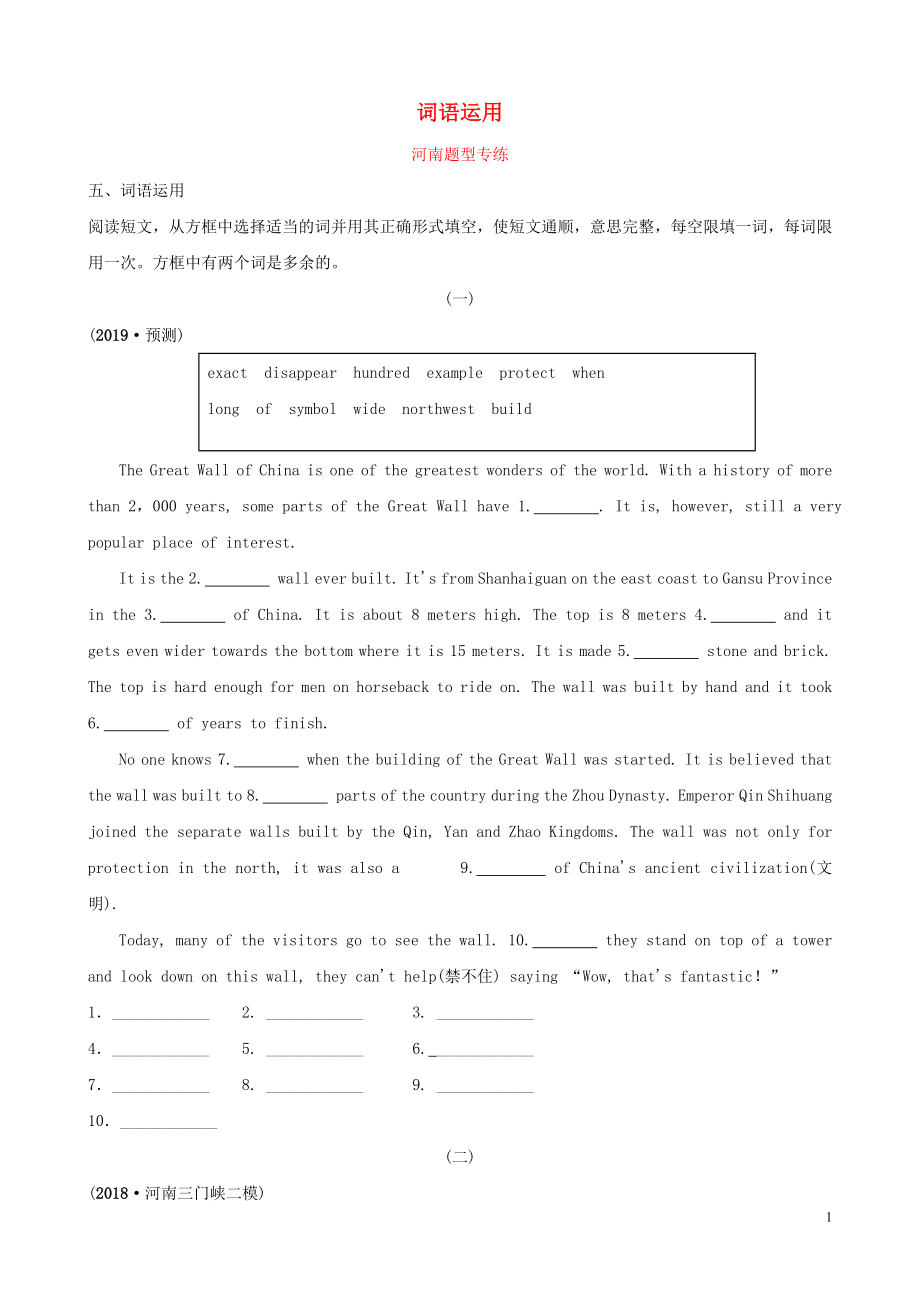《河南省2019年中考英語(yǔ)語(yǔ)法題型專項(xiàng)復(fù)習(xí) 題型五 詞語(yǔ)運(yùn)用題型專練》由會(huì)員分享���,可在線閱讀,更多相關(guān)《河南省2019年中考英語(yǔ)語(yǔ)法題型專項(xiàng)復(fù)習(xí) 題型五 詞語(yǔ)運(yùn)用題型專練(3頁(yè)珍藏版)》請(qǐng)?jiān)谘b配圖網(wǎng)上搜索���。
1���、詞語(yǔ)運(yùn)用
河南題型專練
五、詞語(yǔ)運(yùn)用
閱讀短文���,從方框中選擇適當(dāng)?shù)脑~并用其正確形式填空���,使短文通順,意思完整���,每空限填一詞���,每詞限用一次���。方框中有兩個(gè)詞是多余的���。
(一)
(2019·預(yù)測(cè))
exact disappear hundred example protect when
long of symbol wide northwest build
The Great Wall of China is one of the greatest wonders of the world. With a history of more than 2���,000 years, some
2、parts of the Great Wall have 1. . It is, however, still a very popular place of interest.
It is the 2. wall ever built. It's from Shanhaiguan on the east coast to Gansu Province in the 3. of China. It is about 8 meters high. The top is 8 meters 4. and it gets even wid
3���、er towards the bottom where it is 15 meters. It is made 5. stone and brick. The top is hard enough for men on horseback to ride on. The wall was built by hand and it took 6. of years to finish.
No one knows 7. when the building of the Great Wall was started. It is believed t
4���、hat the wall was built to 8. parts of the country during the Zhou Dynasty. Emperor Qin Shihuang joined the separate walls built by the Qin, Yan and Zhao Kingdoms. The wall was not only for protection in the north, it was also a 9. of China's ancient civilization(文明).
Today, m
5、any of the visitors go to see the wall. 10. they stand on top of a tower and look down on this wall, they can't help(禁不住) saying “Wow, that's fantastic���!”
1.____________ 2. ____________ 3. ____________
4.____________ 5. ____________ 6. ____________
7.____________ 8. ___________
6���、_ 9. ____________
10.____________
(二)
(2018·河南三門峽二模)
he into leave but deep late shout
sense toward include hear and
Einstein is a world-famous scientist. In 1899, he studied at a famous university in Zurich(蘇黎世). His teacher was Professor Minkevsky.
Once Einstein asked Minkevsky, “How
7、 can a person, like me, 1. his clear footprints on the road of science and make a great contribution���?” Minkevsky said that it was a “complicated” problem 2. he had to give him an answer later.
Three days 3. ���, Minkevsky told Einstein that the answer was coming! But he didn't s
8、ay anything. They walked 4. a building site. He asked Einstein to set foot on a concrete(混凝土) road that the workers had just finished.
All the workers 5. at him. Einstein was very confused. “Sir, are you leading me the wrong way���?” he asked.
“Think about it���,” Minkevsky said. “Can't
9���、you see? Only the new concrete road surface can leave 6. footprints. The old road surface has been hard for a long time. Many people leave steps on the old road. You cannot find your footprint there.” 7. that, Einstein thought for a long time and nodded.
After that, a very strong 8
10、. of innovation(創(chuàng)新) began to guide Einstein's thinking and, he tried again and again to discover new theories(理論). Nobody could tell him what to do. No book could guide him. But he said, “I never memorize what dictionaries carry. My brain only remembers those things that are not 9. i
11���、n books.” It was because of this that Einstein left 10. shining footprints in the history of science.
1.____________ 2. ____________ 3. ____________
4.____________ 5. ____________ 6. ____________
7.____________ 8. ____________ 9. ____________
10.____________
參考答案
(一)
1.disappeared 2.longest 3.northwest 4.wide 5.of
6.hundreds 7.exactly 8.protect 9.symbol 10.When
(二)
1.leave 2.and 3.later 4.toward 5.shouted
6.deep 7.Hearing 8.sense 9.included 10.his
3
 河南省2019年中考英語(yǔ)語(yǔ)法題型專項(xiàng)復(fù)習(xí) 題型五 詞語(yǔ)運(yùn)用題型專練
河南省2019年中考英語(yǔ)語(yǔ)法題型專項(xiàng)復(fù)習(xí) 題型五 詞語(yǔ)運(yùn)用題型專練

